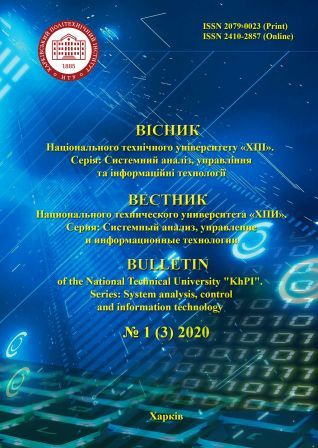UNIVARIATE AND MULTIVARIATE POLYNOMIAL REGRESSION CONSTRUCTION FROM A REDUNDANT REPRESENTATION USING AN ACTIVE EXPERIMENT
DOI:
https://doi.org/10.20998/2079-0023.2020.01.02Keywords:
multi-dimensional polynomial regression, normalized orthogonal polynomials of Forsythe, redundant representation, group method of data handling, cluster analysis, linear equalitiesAbstract
We consider the problem of a multidimensional polynomial regression construction from a given redundant representation based on the results of an active experiment. Redundant representation means inclusion in it the members which are possibly absent in the structure of the studied regression. Thus, we have a problem not only to estimate the values of the unknown coefficients of multidimensional polynomial regression from the results of an active experiment, but also to eliminate the redundant members from its redundant representation. The solution to this problem is based on: (a) obtaining new properties of the coefficients of normalized orthogonal polynomials of Forsythe; (b) possibility of reducing the problem of estimating the unknown coefficients for nonlinear members of multivariate polynomial regression to the problem of estimating the coefficients for the set of univariate polynomial regressions and solving the corresponding systems of linear equalities; (c) using the method to eliminate the redundant members of multidimensional nonlinear polynomial regression which organically includes both the methodology of cluster analysis and the main idea of the group method of data handling – dividing the experimental data into two sets, one of which is not used to estimate unknown coefficients of multidimensional polynomial regression given by a redundant representation.References
Zgurovsky M. Z., Pavlov A. A. Combinatorial Optimization Problems in Planning and Decision Making: Theory and Applications.Cham: Springer Publ., 2019. 526 p. doi: 10.1007/978-3-319-98977-8
Zgurovsky M. Z., Pavlov A. A. Trudnoreshaemye zadachi kombinatornoj optimizacii v planirovanii i prinjatii reshenij [Intractable combinatorial optimization problems in planning and decision making].Kiev, Nauk. dumka Publ. 716 p.
Pavlov A. A., Kalashnik V. V. Rekomendacii po vyboru zony provedenija aktivnogo jeksperimenta dlja odnomernogo polinomial'nogoregressionnogo analiza [Recommendations for choosing the zone ofan active experiment for one-dimensional polynomial regression analysis]. Visnyk NTUU “KPI”. Seriya «Informatyka, upravlinnya ta obchislyuvalna tekhnyka». Kiev, “Vek+” Publ., 2014, no. 60, pp. 41–45
Pavlov A. A., Kalashnik V. V., Kovalenko D. A. Postroenie mnogomernoj polinomial'noj regressii. Regressija s povtorjajushhimisja argumentami vo vhodnyh dannyh [Multidimensional polynomial regression construction. Regression with duplicate arguments in the input]. Visnyk NTUU “KPI”. Seriya «Informatyka, upravlinnya ta obchislyuvalna tekhnyka». Kiev, “Vek+” Publ., 2015, no. 62, pp. 57–61
Hudson D.J. Statistics Lectures, Volume 2: Maximum Likelihood andLeast Squares Theory. CERN Reports 64(18). Geneva, CERN, 1964.(Russ. ed.: Hudson D. Statistika dlja fizikov: Lekcii po teorii verojatnostej i jelementarnoj statistike. Moscow, Mir Publ., 1970. 296 p.).doi: 10.5170/CERN-1964-018
Zgurovsky M. Z., Pavlov A. A. Prinyatie resheniy v setevykh sistemakh s ogranichennymi resursami [Decision making in network systems with limited resources]. Kiev, Nauk. dumka Publ., 2010, 573 p.
Pavlov A. A., Chekhovskiy A. V. Postroenie mnogomernoj polinomial'noj regressii. Aktivnyj jeksperiment [Multidimensional polynomial regression construction. Active experiment]. System researchand information technologies, 2009, no. 1, pp. 87–99
Pavlov A. A.., Chekhovskiy A. V. Postroenie mnogomernoj polinomial'noj regressii. Aktivnyj jeksperiment s ogranichenijami [Multidimensional polynomial regression construction. Active experimentwith limitations]. Vestnik Nats. tekhn. un-ta "KhPI": sb. nauch. tr.Temat. vyp.: Sistemnyy analiz, upravlenie i informatsionnye tekhnologii [Bulletin of the National Technical University "KhPI": a collection of scientific papers. Thematic issue: System analysis, management and information technology]. Kharkov, NTU "KhPI" Publ.,2009, no. 4, pp. 174–186
Pavlov A. A., Chekhovskiy A. V. Svedenie zadachi postroenija mnogomernoj regressii k posledovatel'nosti odnomernyh zadach [Reducingthe problem of multivariate regression constructing to a sequence ofone-dimensional problems]. Visnyk NTUU “KPI”. Seriya«Informatyka, upravlinnya ta obchislyuvalna tekhnyka». Kiev,“Vek+” Publ., 2008, no. 48, pp. 111–112
Ivahnenko A.G. Modelirovanie slozhnyh sistem. Kiev, Vyshhashkola Publ., 1987
Nastenko E., Pavlov V., Boyko G., Nosovets O. Mnogokriterial'nyjalgoritm shagovoj regressii. Biomedychna inzheneriya i tekhnolohiya[Biomedical ingeneering and technology]. 2020, no. 3, pp. 48–53.doi: 10.20535/2617-8974.2020.3.195661
Kovalenko D. A. Zastosuvannya pryntsypiv bahatovymirnoyipolinomial'noyi rehresiyi dlya rozviduval'noho analizu danykh taznakhodzhennya liniyi rehresiyi [Applying multiple polynomial regression principles for exploratory data analysis and regression analysis]. Scientific Review, vol. 3, no. 46, 2018, pp. 81–94.
Downloads
How to Cite
Issue
Section
License
Copyright (c) 2020 Bulletin of National Technical University "KhPI". Series: System Analysis, Control and Information TechnologiesAuthors who publish with this journal agree to the following terms:
- Authors retain copyright and grant the journal right of first publication with the work simultaneously licensed under a Creative Commons Attribution License that allows others to share the work with an acknowledgement of the work's authorship and initial publication in this journal.
- Authors are able to enter into separate, additional contractual arrangements for the non-exclusive distribution of the journal's published version of the work (e.g., post it to an institutional repository or publish it in a book), with an acknowledgement of its initial publication in this journal.
- Authors are permitted and encouraged to post their work online (e.g., in institutional repositories or on their website) prior to and during the submission process, as it can lead to productive exchanges, as well as earlier and greater citation of published work (See The Effect of Open Access).


